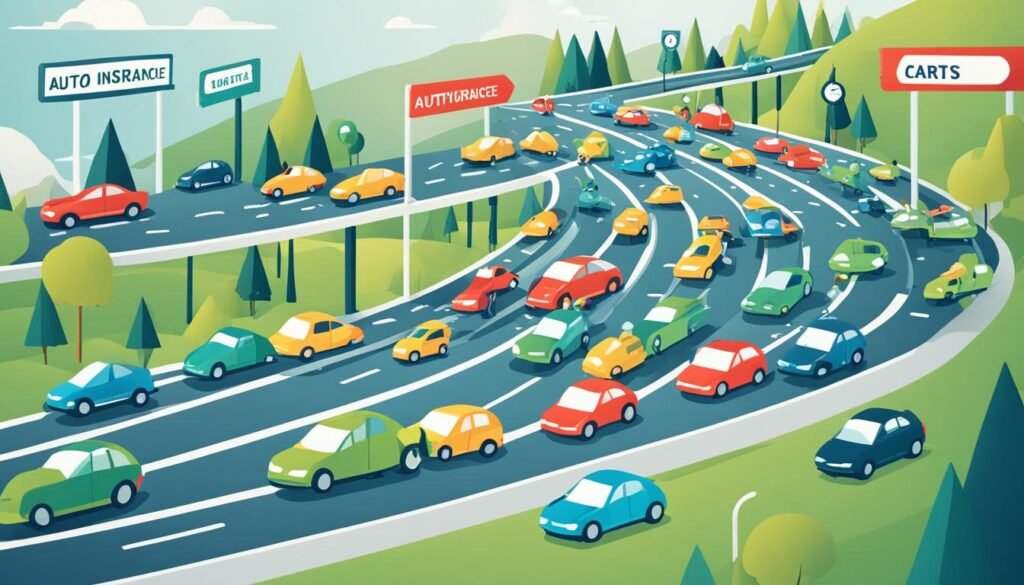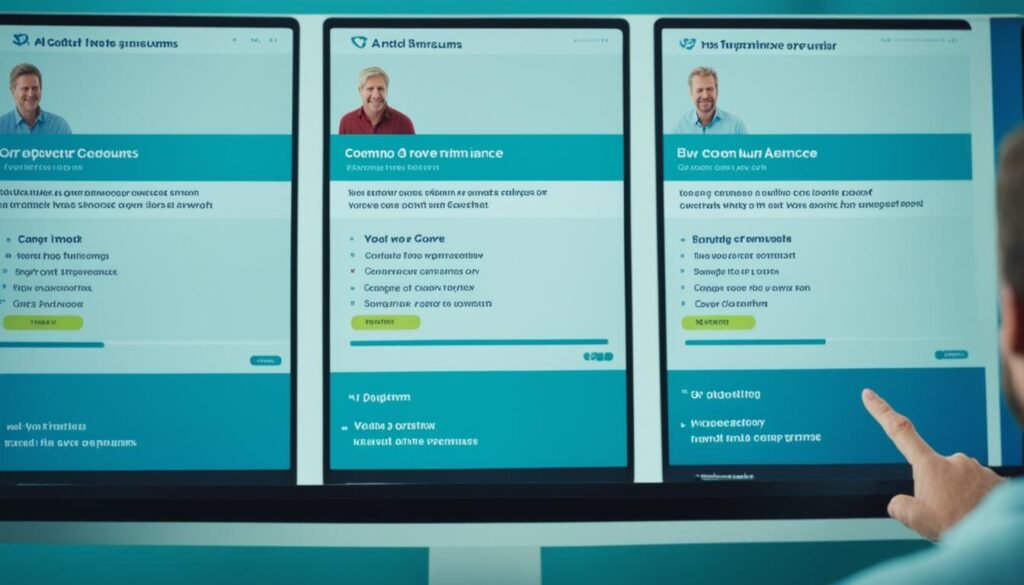Choosing the right auto insurance is tough, but smart moves can get you great rates. We’ll share expert advice to guide you. You’ll learn how to find good car insurance that’s affordable.
Key Takeaways
- Comparing quotes from multiple insurers is crucial to finding the best car insurance rates.
- Maintaining a clean driving record can qualify you for auto insurance discounts.
- Bundling your auto insurance with other policies can help you save money.
- Increasing your deductible can lower your monthly premiums.
- Improving your credit score can significantly impact your cheap car insurance rates.
Understanding Auto Insurance Rates
Good auto insurance rates come from knowing what makes premiums high or low. Insurance companies look at your driving history, age, where you live, and your car type. They also consider how risky you might be to decide your rates.
Factors That Affect Premiums
Several things can make your auto insurance rates go up or down. These include your:
- Driving history: They check if you’ve had accidents, tickets, or made claims.
- Age and gender: Young drivers under 25 often pay more. Gender is a factor too, as men and women may drive differently.
- Location: If you live in a busy or crime-prone area, you might pay more.
- Vehicle type: How much it costs to fix your car or how likely it is to get stolen matters.
- Annual mileage: More driving means more chances for accidents, which can increase insurance costs.
The Role of Risk Assessment
Insurance companies assess the risk of you making a claim. They look at all the factors we’ve mentioned and more, like your credit score. This helps them set fair premiums based on your risk level.
Knowing about auto insurance rates’ key factors and the risk assessment process can help. It makes you more aware when you’re buying insurance. Staying informed can lead to smarter choices.

“The price you pay for auto insurance is directly related to the risk you pose to the insurance company. The better you can manage that risk, the lower your rates will be.”
Shop Around and Compare Quotes
Looking for good car insurance rates? It’s smart to shop around and compare quotes from several companies. This helps you see the best coverage and find the most competitive rates for your needs.
Initially, finding car insurance might feel overwhelming. However, it is a key step in getting a good deal. By comparing auto insurance quotes, you can check the coverage, deductibles, and costs from various insurers. This allows you to choose the option that fits your budget and needs best.
- Begin by collecting your driving history, car info, and coverage needs.
- Next, go to insurance companies’ websites or use comparison tools online for quotes.
- Look at the quotes together, focusing on coverage, deductibles, and any deals or perks.
- Think about customer service, financial strength, and reviews of the insurers.
- After finding the best choice, make sure you understand the policy and coverage limits before deciding.
“The secret to finding the best car insurance rates is checking quotes from many providers. It lets you get the coverage you need at a great price.”
Spending time to compare auto insurance quotes is worthwhile. It ensures you get good value and the necessary protection.

Maintain a Good Driving Record
Your driving record matters a lot for how much you pay for car insurance. Driving safely, without getting tickets or causing accidents, helps keep your rates lower. If you follow the rules of the road, stay focused, and avoid driving when you’re not fully alert, you’ll pay less for insurance. This is because insurance companies consider you less of a risk.
The Impact of Traffic Violations
Getting traffic tickets affects how much you pay for insurance. These violations, from minor speeding tickets to serious offenses like DUIs, stay on your record for a certain number of years. The time they stay on your record depends on the offence and where you live.
Avoiding major violations like DUIs shows you’re a safer driver. This can lead to cheaper insurance. For instance, DUIs might stay on your record forever in some places. Meanwhile, accidents you cause can affect your record for 3 to 5 years. But, you can sometimes remove small infractions by taking defensive driving courses.
Safe Driving Practices
Driving safely can save you a lot of money on insurance. If you keep a clean record, the savings can average up to $289 a year. But if you get a DUI, your costs could jump by over $1,300 a year. And if you have an accident, you might pay $353 a year more.
Remember to always follow the rules carefully, stay focused while driving, and learn defensive driving. Many insurance companies, including Liberty Mutual, appreciate safe driving. They may offer you discounts or let you join special courses to keep your record clean.
| Violation Type | Average Annual Premium Increase |
|---|---|
| DUI | $1,363 |
| At-Fault Accident | $353 |
| Clean Driving Record | $2,706 |
“Keeping your driving record clean is key to paying less for car insurance. Safe driving protects everyone and shows insurance companies you’re a responsible driver. This makes you a good choice for lower premiums.”

Bundle Your Policies
One great way to cut costs on car insurance is by bundling it with other types, like home or renters insurance. This offers discounts to those who get all insurances from one company. By doing this, you could save a lot on your yearly insurance bill.
Many smart shoppers bundle car and home insurance to save more. Doing this doesn’t just lower your bills. It also makes things easier by dealing with just one insurance company for everything. You get the peace of mind and the savings too.
Beyond the money saved, bundling policies means less hassle keeping track of everything. It’s easier to know you have the right kinds of coverage this way. And, when you need to use your insurance, dealing with claims can be smoother.
To really save, shop around for the best deals. Compare what different companies offer in terms of savings and service. Finding the best mix of coverage, price, and customer care is the key. This way, you make the most of your insurance budget and lower your car insurance payments.

“Bundling your auto and home insurance policies can be a game-changer when it comes to saving money on your insurance costs. The discounts offered by many providers make it a strategy worth exploring.”
Increase Your Deductible
Raising your auto insurance deductible is a smart move to cut costs. A higher deductible means you pay more if you file a claim. Yet, you’ll save a lot on your insurance bills. But it’s vital to pick a deductible that keeps your coverage affordable.
The Sweet Spot: Choosing the Right Deductible
Finding the right deductible is crucial. It’s about saving money but still being able to cover costs if needed. Think about your budget and how much risk you’re willing to take. A higher deductible is good if you have savings. But, it shouldn’t be so high that it hurts your wallet too much.
Experts suggest picking a deductible within $500 to $1,000 for most people. By raising your auto insurance deductible, you might save a lot each year. Remember to balance the deductible and premiums. You don’t want to take on too much risk.
“The higher your deductible, the lower your premiums will be. But you’ll need to have enough savings to cover the deductible if you ever need to file a claim.”
Your deductible also influences your policy’s coverage limits. A higher deductible often means more coverage. This is good for serious accidents. But, it depends on what your budget and risk level are.
Raising your auto insurance deductible and balancing the deductible and premiums is key. You’ll save money and keep the coverage you need. The point is to find what works best for you.
Take Advantage of Discounts
Smart auto insurance shoppers know discounts can slash their bills. Insurers often have many ways to cut down your premium costs. Using these offers means more cash stays with you.
Common Auto Insurance Discounts
When checking out different policies, ask about these common discounts:
- Good Driver Discount – Safe drivers without accidents or serious violations can get this.
- Good Student Discount – Doing well in school can earn students a reward.
- Defensive Driving Course Discount – Taking this course can lower your premiums.
- Safety Feature Discount – Cars with safety tech may see their rates drop.
- Multi-Policy Discount – Combining different coverages often leads to savings.
- Low Mileage Discount – Less driving could mean lower insurance costs.
It’s worth looking into various car insurance saving strategies. Doing so can help you find great rates that fit your budget.
“Discounts can make a big difference in the cost of your auto insurance. Be sure to ask your provider about all the available discounts you may qualify for.”
Improve Your Credit Score
Your credit score affects how much you pay for auto insurance. Insurers often check credit info to evaluate risk. Keeping a good credit score means you might pay less for car insurance. So, it’s smart to work on your credit score.
If you want to up your credit score and spend less on car insurance, try these tips:
- Pay your bills on time. Your payment history is vital for your credit score. Make all payments, like credit cards, on time.
- Reduce your debt. Having a lot of debt can hurt your credit score. Try to lower debt and keep credit card balances low.
- Check your credit report often. Look for errors and dispute them. This helps ensure your credit report is correct.
- Don’t apply for new credit too often. It can lower your score temporarily. Minimize new credit card or loan applications.
- Ask for a credit limit increase if you have available credit. This helps your credit score by lowering your credit utilization ratio.
Improving your credit score could mean paying less for auto insurance. It really pays off to have a good credit score. So, keep trying to improve it.
| Credit Score Range | Impact on Auto Insurance Rates |
|---|---|
| 800-850 | Lowest insurance rates |
| 700-799 | Average insurance rates |
| 600-699 | Higher insurance rates |
| 500-599 | Highest insurance rates |
The effect of your credit score on auto insurance is big. With some effort, you can cut your insurance costs. It’s all about keeping that credit score high.
Consider Usage-Based Insurance
Looking for good auto insurance? Think about usage-based car insurance. Also called pay-as-you-drive or telematics. It tracks your driving habits, like how much you drive and how you brake, then sets your premiums based on this.
If you drive safely and not too much, this insurance can be cheaper. Usage-based insurance gives discounts right away. It can also save you money in the long run by rewarding good driving.
Measuring Your Driving Behavior
These programs check many things to gauge how risky your driving is:
- Driving-based programs look at braking, speeding, and when you drive.
- Mileage-based programs just see how many miles you cover.
By watching your driving over time, insurers make premiums that match your real risk.
The Benefits and Drawbacks of Usage-Based Insurance
Here are the top pluses of this insurance:
- You might pay less, or more, depending on how you drive.
- It pushes you to be safer on the road.
- It can help clear up who’s at fault in an accident.
Yet, there are a few downsides too:
- Reckless driving could up your costs.
- It might miss noticing very careful driving.
Tips for Maximizing Usage-Based Insurance Savings
Follow these steps to get the best out of your usage-based insurance:
- Try to drive less, reducing your mileage.
- Avoid driving from midnight to 4 a.m.
- Use the tips they give you to drive better.
- Don’t get distracted while driving.
Compared to pay-per-mile insurance, the former can save you more. It offers more tailored discounts based on your actual driving.
Interested in usage-based insurance? Start with a quote and sign up for a program like Progressive’s Snapshot. It’s a great way to save money and become a better driver over time.
“Usage-based insurance lets drivers lower their premiums by showing they drive safely all the time. This makes the roads safer and means less risk for insurance companies.”
good auto insurance rates
Getting good auto insurance rates takes a smart approach. Know what affects your rates, shop around, and grab discounts. You’ll find a plan that’s both affordable and right for you.
Understand the Factors That Affect Rates
Your age, driving record, where you live, and credit score all influence your car insurance rates. Knowing this info can guide you to the best choices for your coverage.
Shop Around and Compare Quotes
It’s wise not to pick the first insurance quote you get. Shop around and get quotes from different companies. Look at what they offer in terms of coverage, deductibles, and discounts to find the best deal.
Take Advantage of Discounts
Car insurance companies often provide various discounts. These can be for safe driving, good credit, or bundling policies. Remember to check with your insurer about available discounts for you.
| Age | Median Full Coverage Rate | Median Minimum Coverage Rate |
|---|---|---|
| 20 | $3,573 | $1,023 |
| 30 | $1,768 | $502 |
| 35 | $1,717 | $487 |
| 40 | $1,676 | $477 |
| 50 | $1,570 | $452 |
| 60 | $1,507 | $445 |
| 70 | $1,606 | $493 |
Follow these tips and you can land a great deal on auto insurance. It’ll be friendly to your wallet and meet your coverage needs well.
“The key to finding good auto insurance rates is to shop around, understand the factors that affect premiums, and take advantage of all available discounts.”
Keep in mind, your auto insurance situation might change over the years. Be sure to review your policy each year and make any needed changes. Being on top of things ensures you get the most for your money with your car insurance.
Review Your Coverage Annually
It’s essential to have the right car insurance coverage. To make sure it fits, check it yearly. Life changes like moving or getting a new car can affect what you need in your policy. So, go over your policy every year. Make sure it still works for you.
Adjusting Coverage as Needed
When looking at your car insurance policy, think about these points. They might push you to change your coverage:
- Changes in your driving habits or commute
- Getting a new car or changing the ones you have
- Moving to a new city or state
- Big life events, like getting married, divorced, or having a new young driver on your policy
- Changes in your money situation that could mean changing your deductibles or coverage amounts
By always checking your car insurance and making changes as necessary, you can keep the right level of protection. This careful step can help avoid overpaying or having coverage gaps. It saves you money while making sure you and your car are safe.
“Regular policy reviews are essential to ensure your auto insurance coverage keeps pace with your changing needs and life circumstances.”
Conclusion
To get good auto insurance rates, you need to be proactive. Understand what affects your rates. Shop around and work on keeping a safe driving record. Also, use discounts to lower your costs.
Be sure to look at your policy every year. Make any changes necessary to get the best deal. The most important things for cheap car insurance are to keep learning, compare prices, and use all the help you can get.
With some effort and the right approach, you can find great insurance rates. This way, you’ll have the right coverage for you and your wallet. Follow these tips, and you’ll enjoy both peace of mind and savings.






2 Comments
Pingback: Arlington VA Car Insurance: Best Rates & Coverage
Pingback: VA Car Insurance Rates: Find Best Deals in Virginia